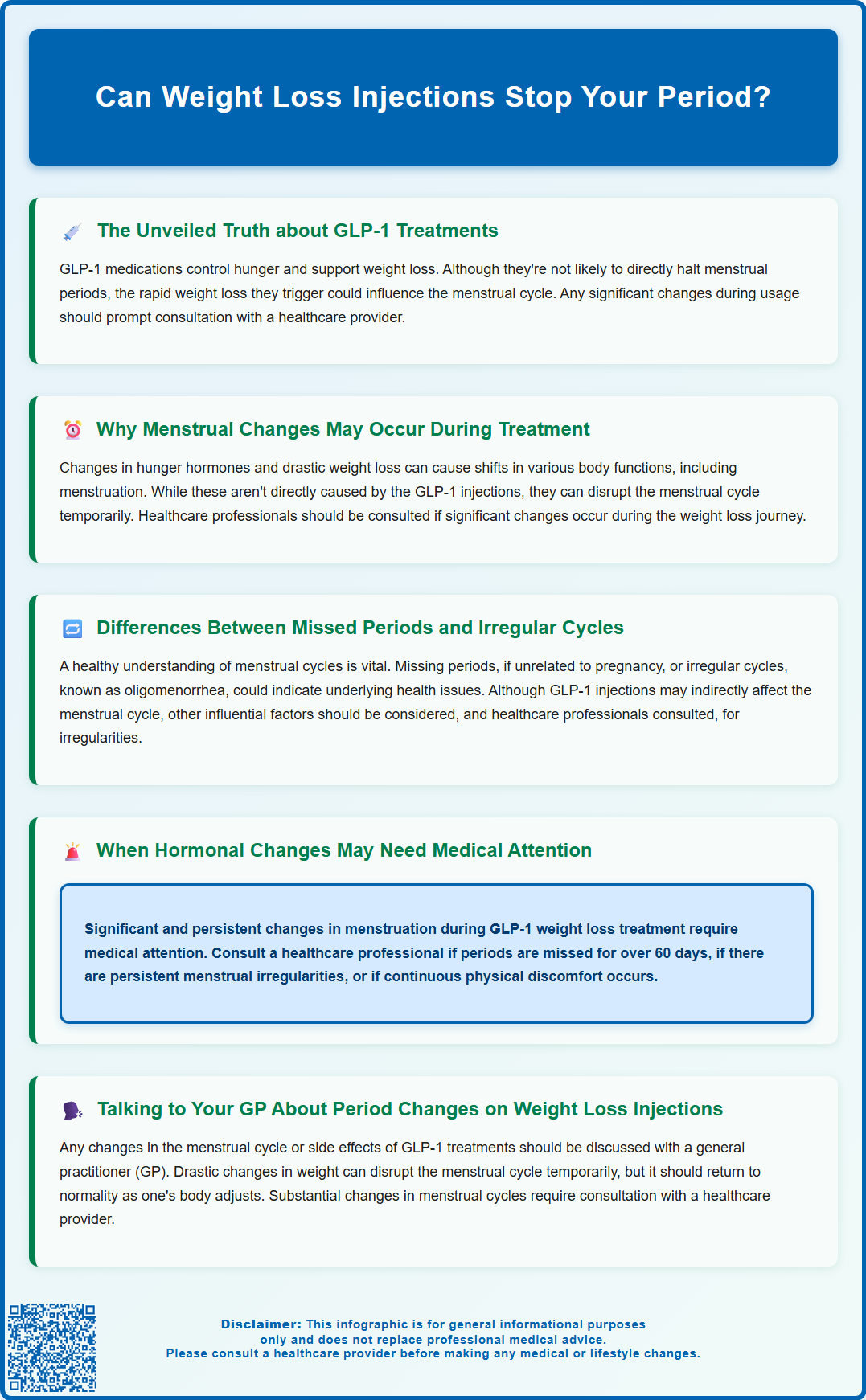Weight loss injections such as semaglutide (Wegovy) and liraglutide (Saxenda) are increasingly prescribed for obesity management in the UK. Whilst these GLP-1 receptor agonists are not designed to directly affect reproductive hormones, some women report menstrual irregularities during treatment. These changes typically result from rapid weight loss, metabolic shifts, and alterations in insulin sensitivity rather than direct hormonal effects. Menstrual disorders are not listed as adverse reactions in UK product information, but any significant disruption warrants clinical assessment. Women of reproductive age should use effective contraception during treatment and report menstrual changes to their healthcare provider.
Summary: Weight loss injections do not directly stop periods, but rapid weight loss and metabolic changes they cause can trigger menstrual irregularities including amenorrhoea in some women.
- GLP-1 receptor agonists (semaglutide, liraglutide) are not listed as causing menstrual disorders in UK product information, but indirect effects through weight loss may occur.
- Rapid weight loss can trigger functional hypothalamic amenorrhoea, where the brain temporarily suspends reproductive function due to perceived energy scarcity.
- Women with PCOS may experience cycle normalisation due to improved insulin sensitivity, whilst others may develop irregular periods or amenorrhoea.
- Seek medical advice if you miss three consecutive periods, experience severe symptoms, or have concerns about fertility or bone health.
- Semaglutide requires a 2-month washout period before planned pregnancy, and effective contraception is recommended during treatment.
- Management includes ensuring adequate nutrition, potentially slowing weight loss rate, and specialist referral if amenorrhoea persists beyond six months.
Table of Contents
Can Weight Loss Injections Affect Your Menstrual Cycle?
Weight loss injections, particularly GLP-1 receptor agonists such as semaglutide (Wegovy) and liraglutide (Saxenda), have become increasingly prescribed for weight management in the UK. Whilst these medications are not directly designed to affect reproductive hormones, some women have reported menstrual irregularities during treatment. It is important to note that menstrual disorders are not listed as adverse reactions in the UK Summary of Product Characteristics (SmPCs) for either Wegovy or Saxenda, and the relationship appears complex and multifactorial.
The menstrual cycle is sensitive to numerous physiological changes, and weight loss injections may influence periods through several indirect mechanisms. These include rapid weight reduction, alterations in metabolic hormones, changes in insulin sensitivity, and shifts in adipose tissue distribution. Women with polycystic ovary syndrome (PCOS) may experience different effects compared to those without underlying hormonal conditions, as GLP-1 medications can improve insulin resistance.
In the UK, the MHRA has approved semaglutide (Wegovy) and liraglutide (Saxenda) specifically for weight management in adults with obesity or overweight with weight-related comorbidities (as per NICE TA875 and TA664). Women of reproductive age should be counselled about using effective contraception during treatment. According to the SmPCs, semaglutide should be discontinued at least 2 months before a planned pregnancy, and both medications should be stopped immediately if pregnancy occurs. Any significant menstrual disruption warrants clinical assessment to exclude other causes, and suspected adverse effects should be reported through the MHRA Yellow Card scheme.

How GLP-1 Medications May Impact Periods
GLP-1 receptor agonists work by mimicking the incretin hormone glucagon-like peptide-1, which regulates appetite, gastric emptying, and glucose metabolism. These medications bind to GLP-1 receptors primarily in the pancreas, brain, and gastrointestinal tract, leading to increased insulin secretion, reduced glucagon release, and enhanced satiety. While GLP-1 receptors have variable distribution in reproductive tissues, the metabolic changes induced by GLP-1 agonists can have downstream effects on the hypothalamic-pituitary-ovarian axis, which governs menstrual function.
The hypothalamus is particularly sensitive to energy availability and metabolic signals. When the body perceives significant energy deficit or metabolic stress, it may suppress reproductive function as a protective mechanism. GLP-1 medications can alter levels of various hormones including insulin, leptin, and adipokines, all of which communicate nutritional status to the reproductive system. In women with insulin resistance or PCOS, improved insulin sensitivity from GLP-1 treatment may normalise previously irregular cycles by reducing hyperinsulinaemia and androgen excess, as demonstrated in several clinical studies.
Additionally, adipose tissue functions as an endocrine organ, producing oestrogen through aromatisation of androgens. Reduction in body fat can temporarily disrupt oestrogen levels, potentially affecting menstrual regularity. Some women may experience lighter periods, heavier bleeding, or amenorrhoea during treatment. It's important to note that menstrual outcomes were not primary endpoints in major GLP-1 clinical trials, and much of the current understanding comes from post-marketing surveillance and patient reports. Healthcare professionals should document menstrual changes as part of routine monitoring.
Why Rapid Weight Loss Can Stop Menstruation
Rapid weight loss, regardless of the method employed, can trigger functional hypothalamic amenorrhoea, a condition where the brain temporarily suspends reproductive function in response to perceived energy scarcity. The hypothalamus requires adequate energy reserves to maintain the pulsatile secretion of gonadotrophin-releasing hormone (GnRH), which stimulates the pituitary gland to produce luteinising hormone (LH) and follicle-stimulating hormone (FSH). When weight loss occurs quickly, the hypothalamus may interpret this as a threat to survival and downregulate reproductive hormones.
This protective mechanism evolved to prevent pregnancy during periods of nutritional stress. Women who lose significant weight rapidly are at higher risk of menstrual disruption, though individual susceptibility varies considerably based on genetic factors, baseline body composition, and metabolic health. Some women may experience amenorrhoea with relatively modest weight loss, whilst others maintain regular cycles despite substantial reductions.
Weight loss injections can facilitate significant weight reduction, especially in the first three to six months of treatment. The STEP 1 trial showed semaglutide produced average weight loss of 14.9% of body weight over 68 weeks, compared with 2.4% with placebo. This rate of loss, whilst clinically beneficial for metabolic health, may be sufficient to trigger menstrual irregularities in susceptible individuals. Nutritional adequacy is essential during weight loss. According to NICE CKS guidance on amenorrhoea, low energy availability is a key driver of functional hypothalamic amenorrhoea. Ensuring adequate nutrition whilst using weight loss medications is essential for maintaining reproductive health alongside achieving weight management goals.
When to Seek Medical Advice About Missed Periods
Women experiencing menstrual changes whilst using weight loss injections should seek medical advice in several specific circumstances. According to NICE Clinical Knowledge Summaries (CKS) on amenorrhoea, any woman who misses three consecutive periods (secondary amenorrhoea) should contact her GP for assessment. A pregnancy test should always be performed first to exclude pregnancy, particularly as fertility may increase with weight loss, and GLP-1 medications are not recommended during pregnancy.
Immediate medical attention is warranted if missed periods are accompanied by concerning symptoms such as severe abdominal pain, heavy bleeding, abnormal vaginal discharge, signs of pregnancy, symptoms of thyroid dysfunction (significant fatigue, cold intolerance, hair loss), or signs of hyperprolactinaemia (galactorrhoea, visual disturbances, headaches). Severe pain with bleeding requires same-day assessment to exclude ectopic pregnancy or other urgent gynaecological conditions.
First-line investigations typically include serum/urine hCG, FSH, LH, oestradiol, prolactin, and thyroid function tests. Androgens may be measured if hyperandrogenism is suspected, and pelvic ultrasound may be indicated in some cases. NICE CKS recommends that secondary amenorrhoea lasting more than six months should prompt referral for specialist assessment. Women with pre-existing PCOS, previous menstrual irregularities, or those who have lost more than 10% of their body weight rapidly should have a lower threshold for seeking review. Those planning pregnancy should discuss their menstrual changes with their GP, as semaglutide requires a 2-month washout period before conception (as per the Wegovy SmPC). Additionally, women concerned about bone health should request assessment, particularly if amenorrhoea persists beyond six months.
Managing Menstrual Changes While Using Weight Loss Injections
Effective management of menstrual irregularities during weight loss injection therapy requires a multifaceted approach balancing weight management goals with reproductive health. Firstly, ensuring adequate nutritional intake is paramount. Women should work with dietitians to develop individualised nutrition plans that provide sufficient energy and nutrients to support reproductive function, with particular attention to iron, zinc, vitamin D, and B vitamins.
Slowing the rate of weight loss may help restore menstrual function whilst still achieving health benefits. This might involve dose adjustment of the GLP-1 medication in consultation with the prescribing clinician, or incorporating structured eating patterns that prevent excessive energy restriction. Regular moderate exercise supports metabolic health but excessive or intense training should be avoided, as this can compound hypothalamic suppression. Women should aim for 150 minutes of moderate activity weekly, as per UK Chief Medical Officers' guidelines.
For women with persistent amenorrhoea, the primary focus should be on correcting low energy availability, as recommended in functional hypothalamic amenorrhoea management guidelines. If amenorrhoea persists despite nutritional rehabilitation, referral to an endocrinologist or gynaecologist is appropriate. For bone health concerns, DEXA scanning may be considered after 6 months of amenorrhoea or earlier with risk factors. Hormone replacement may be considered under specialist guidance, with transdermal 17β-estradiol with cyclic progesterone often preferred over combined oral contraceptives for bone protection.
Women with PCOS may benefit from continued GLP-1 therapy, but persistent menstrual disruption warrants review to exclude other causes. Regular monitoring should include menstrual diary documentation and periodic weight assessment. Open communication with healthcare providers, realistic weight loss expectations (0.5-1kg weekly as per NHS guidance), and attention to overall wellbeing rather than rapid results will optimise both metabolic and reproductive outcomes during weight loss injection therapy.
Scientific References
- Wegovy 0.25 mg, FlexTouch solution for injection in pre-filled pen - Summary of Product Characteristics.
- Amenorrhoea - Clinical Knowledge Summaries.
- Once-Weekly Semaglutide in Adults with Overweight or Obesity.
- GLP-1 medicines for weight loss and diabetes: what you need to know.
- Wegovy - European Public Assessment Report.
Frequently Asked Questions
How long after starting weight loss injections might my period stop?
Menstrual changes typically occur during the first three to six months of treatment when weight loss is most rapid. Individual responses vary considerably based on the rate of weight loss, baseline body composition, and metabolic health.
Will my periods return to normal after stopping weight loss injections?
Most women experience return of normal menstrual function once weight stabilises and adequate nutrition is maintained. If amenorrhoea persists beyond six months after stopping treatment or stabilising weight, specialist assessment is recommended.
Can I get pregnant whilst using weight loss injections if my periods have stopped?
Yes, ovulation can occur even without regular periods, and fertility may actually increase with weight loss. Effective contraception is essential during treatment, as GLP-1 medications are not recommended during pregnancy and semaglutide requires a 2-month washout period before conception.
The health-related content published on this site is based on credible scientific sources and is periodically reviewed to ensure accuracy and relevance. Although we aim to reflect the most current medical knowledge, the material is meant for general education and awareness only.
The information on this site is not a substitute for professional medical advice. For any health concerns, please speak with a qualified medical professional. By using this information, you acknowledge responsibility for any decisions made and understand we are not liable for any consequences that may result.
Heading 1
Heading 2
Heading 3
Heading 4
Heading 5
Heading 6
Lorem ipsum dolor sit amet, consectetur adipiscing elit, sed do eiusmod tempor incididunt ut labore et dolore magna aliqua. Ut enim ad minim veniam, quis nostrud exercitation ullamco laboris nisi ut aliquip ex ea commodo consequat. Duis aute irure dolor in reprehenderit in voluptate velit esse cillum dolore eu fugiat nulla pariatur.
Block quote
Ordered list
- Item 1
- Item 2
- Item 3
Unordered list
- Item A
- Item B
- Item C
Bold text
Emphasis
Superscript
Subscript












